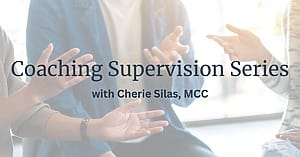As a coach entering supervision for the first time, it’s normal to wonder: What exactly should I discuss? Coaching supervision is a confidential, reflective space that supports your coaching practice, encourages professional growth, and enhances your effectiveness with clients. The good news is nearly any coaching-related topic or issue impacting your practice or well-being is appropriate for supervision.
TL;DR
Supervision can cover client management challenges, ethical dilemmas, personal reflection, coaching techniques, professional development, and practical coaching business issues. Preparing thoughtful questions and proactively reflecting between sessions maximizes your benefits.
Common Topics You Can Bring to Supervision
Use this guide as a practical reference for your supervision sessions, with explanations to help you better understand each topic area:
Client Management Challenges
Client interactions can sometimes feel challenging or uncertain. Supervision provides a safe space to:
- Explore strategies when client progress stalls or sessions feel unproductive.
- Discuss methods to handle client resistance or challenging behaviors constructively.
- Understand and manage your emotional responses in difficult sessions.
- Reflect on how and when to end client relationships ethically and professionally.
Ethical and Professional Dilemmas
Ethical dilemmas frequently arise in coaching practices. Supervision supports you in:
- Navigating confidentiality issues and ensuring sensitive information remains protected.
- Establishing clear and appropriate boundaries with clients.
- Identifying and managing conflicts of interest proactively.
- Ensuring your practice aligns with professional standards such as those outlined by the ICF Code of Ethics.
Personal Reflexive Questions
Your personal insights and self-awareness directly influence your coaching effectiveness. Supervision allows you to:
- Identify and understand emotional triggers experienced during coaching.
- Explore and address insecurities, including feelings of imposter syndrome.
- Recognize personal biases that might unintentionally shape your coaching.
- Reflect deeply on your values and their alignment with your coaching approach.
Coaching Techniques and Approaches
Improving your coaching skills and expanding your toolkit are essential. In supervision, you can:
- Critically assess your coaching effectiveness and identify improvements.
- Analyze case studies to discover alternative coaching methods and techniques.
- Learn and apply new coaching frameworks or methodologies.
- Reflect on successful coaching experiences to reinforce effective practices.
Professional Development
Supervision also supports your ongoing professional growth. You can:
- Enhance specific coaching competencies, such as active listening, presence, or asking powerful questions.
- Identify areas where additional training or education could benefit your practice.
- Set clear professional development goals and regularly track your progress.
- Develop greater self-awareness and emotional intelligence.
Business or Practical Coaching Challenges
Managing practical and logistical aspects of your coaching business can be complex. Supervision can help you:
- Clearly manage client expectations to foster effective and satisfying coaching relationships.
- Navigate contract negotiations and clarify coaching agreements professionally.
- Maintain a healthy balance between coaching commitments, time management, and personal well-being.
- Establish sustainable business practices and cultivate strong client relationships.
Tips for Making the Most of Supervision
- Maintain a reflective journal or notes between supervision sessions to capture thoughts and observations.
- Regularly review your coaching practice to proactively identify topics for discussion.
- Prepare clear and specific questions or challenges before each supervision session.
- Embrace vulnerability; openly discussing your challenges can lead to meaningful insights and growth.
Conclusion
Coaching supervision is a valuable opportunity to explore and resolve a broad range of topics impacting your coaching practice and personal growth. Engage openly and proactively with your supervision sessions to deepen your coaching skills, enhance your professional confidence, and ensure continuous development.
Next Steps
Explore additional resources such as What Is Coaching Supervision and Why Does It Matter? or Getting the Most Out of Coaching Supervision Sessions to deepen your understanding.

Group Supervision Explained
Download our free Group Supervision brochure that answers all your questions about Group Supervision and how it can benefit YOU.
"*" indicates required fields
Explore Other Coaching Supervision Topics
About the Author
Cherie Silas, MCC
She has over 20 years of experience as a corporate leader and uses that background to partner with business executives and their leadership teams to identify and solve their most challenging people, process, and business problems in measurable ways.









